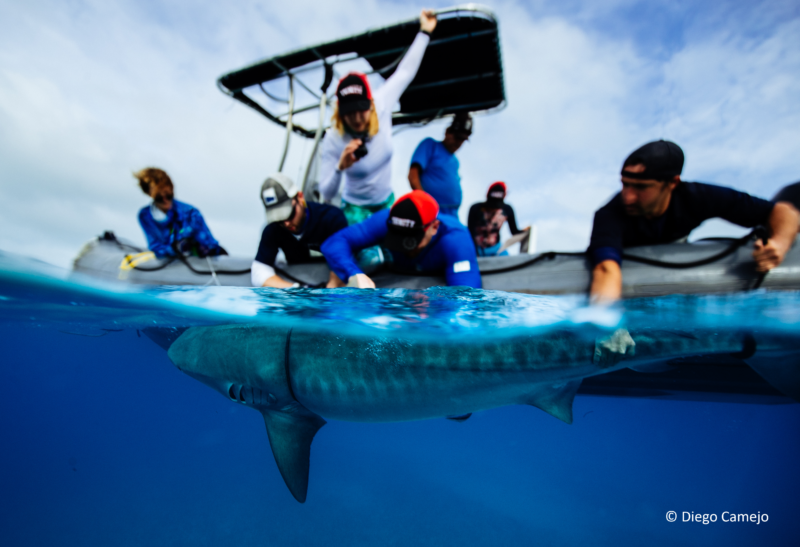A Trinity-led research group, along with US-based NGO Beneath the Waves, used new equipment to assess how the global climate crisis may impact on tiger sharks in the Bahamas.
Cutting-edge biologging devices fixed to the sharks are providing novel biological information helping the team assess the influence of climate change on these apex predators. Tiger sharks can grow up to 5m in length and are found in tropical and subtropical oceans worldwide but have always been difficult to study given their aquatic lifestyle. The scientists involved in the current study overcame this issue by using their biologging devices on the sharks with sensors and video recordings of the sharks’ activities.
The devices measured body temperature, swimming activity and orientation as the animals went about their normal routine. By measuring how temperature influences the sharks’ behaviour and swimming performance, the team will be better placed to predict how these animals will respond to future climate change.
Tiger sharks are classified as “near threatened” by the International Union for the Conservation of Nature, with commercial and artisanal fishing pressure and infrequent reproduction contributing to this status. Several countries continue to cull populations of tiger sharks and some regions have seen declines in shark abundance of around 75 per cent in recent decades.
Dr Nicholas Payne, an assistant professor in zoology in Trinity’s School of Natural Sciences, said in a press statement: “We are all really excited by the initial results. These animals can be incredibly hard to study in their natural habitat, and it’s only recently that the technology is becoming available which allows us to make the kinds of observations we need.”
“Unlike us, these sharks don’t have great physiological mechanisms for controlling their body temperature. As a result, if the temperature of their habitat changes, then so does their performance. Our new data will help us understand how tiger sharks respond to variation in temperature and that will ultimately allow us to make more accurate forecasts of what will happen to these animals if global temperatures continue to change.”
Beneath The Waves CEO Dr Austin Gallagher said that he this kind of research as an important step toward shark conservation in a press statement. He continued: “Apex marine predators like tiger sharks have a critical regulating influence on marine ecosystems, and the more we can learn about their ecology and physiology, the better equipped we’ll be to manage and conserve their populations into the future. Our new data are exciting because they are helping reveal some of the secrets behind where these sharks go and what they do.”
This research was funded by Science Foundation Ireland and the Irish Research Council.
In addition to learning about tiger sharks in more tropical climes, Payne and other scientists at Trinity also perform marine biology research closer to home. To celebrate our connection to the Atlantic Ocean, as part of World Oceans Day, on Saturday June 8th, and to underline the importance of marine research, Trinity will “go Atlantic blue” over the weekend of June 7th – along with over 40 other famous buildings and landmarks across Ireland.







